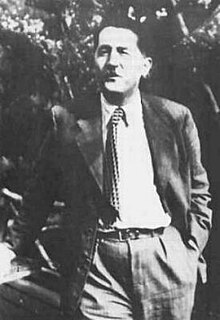Karl Korsch
| Karl Korsch | |
|---|---|

Karl Korsch
|
|
| Born | 15 August 1886 Tostedt, Germany |
| Died | 21 October 1961 (aged 75) Belmont, Massachusetts, USA |
| Alma mater | University of Jena (Dr.jur., 1910) |
| Era | 20th century philosophy |
| Region | Western Philosophy |
| School | Western Marxism |
|
Main interests
|
Politics, Economics, Law |
|
Notable ideas
|
The principle of historical specification |
|
Influenced
|
|
Karl Korsch (August 15, 1886 – October 21, 1961) was a German Marxist theoretician. Along with György Lukács, Korsch is considered to be one of the major figures responsible for laying the groundwork for Western Marxism in the 1920s.
Karl Korsch was born in the small rural village of Tostedt (near Hamburg) to Carl August Korsch and his wife Therese on August 15, 1886. Although Karl’s father worked as a secretary in a city hall bureau, he was deeply devoted to studying the philosophy of Leibniz in his private life. Always longing for something more urban and intellectual, Carl August made the decision to relocate his family west to a village just outside Meiningen when Karl was eleven years old. The move not only allowed the elder Korsch to obtain employment at a local bank (where he eventually rose to the position of vice president), it also gave his children the opportunity to receive a better education. Karl, who showed great intellectual promise at a young age, excelled as a student during his years of schooling at Meiningen.
Beginning in 1906, Korsch successively attended universities in Munich, Geneva, and Berlin, studying various subjects in preparation for a more concentrated study in the field of law. Korsch then entered the University of Jena (incidentally, the same university that awarded Karl Marx his doctorate in philosophy in 1841) to begin working on his law degree in 1908. When he was not occupied with his studies, Korsch was extremely active in the Freie Studenten, a left-of-center student group which pushed for further liberalization of the school’s code of behavior. Korsch also found time to become editor of the student newspaper, to which he also contributed articles. In addition, Korsch organized and participated in lectures that featured prominent socialist speakers such as Eduard Bernstein and Karl Liebknecht. Surprisingly, all of these extracurricular activities did not seem to have the slightest detrimental effect on Korsch's academic performance since he managed to graduate aa doctor of law from the University of Jena's law school with the highest honors in 1910; his thesis title was Die Anwendung der Beweislastregeln im Zivilprozess und das qualifizierte Geständnis. It was around this time that Korsch met Hedda Gagliardi, whom he would eventually marry in 1913.
...
Wikipedia
